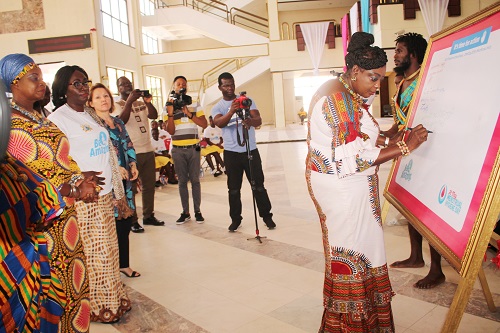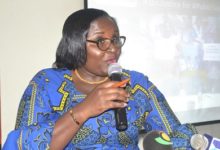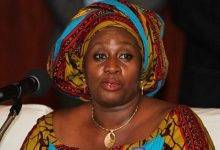
The 2019 Menstrual Hygiene Management (MHM) Day was held in Accra yesterday, with a call on government to remove the 20 per cent import tax on sanitary pads.
The event which is celebrated globally seeks to promote good menstrual hygiene management practices and raise awareness of the challenges women and girls face during menstruation.
It was organised by the Ghana Education Service (GES) in collaboration with the Ministry of Gender, Children and Social Protection (MGCSOP), the Ministries of Education, Health, Sanitation and Water Resources among other development partners, and themed “It’s Time for Action on Menstrual Hygiene Management,” with focus on action in the critical areas of MHM education.
Participants at the ceremony included traditional and religious leaders, teachers, women and girls advocate groups as well as students from various second cycle institutions and primary schools.
Sanitary pads attract 20 per cent import under the Ghana Revenue Authority’s (GRA) harmonised code, which in the end drives the cost up and limits its access.
To change the reality of women and girls, they called for increase in investment in school infrastructure and accessibility to clean water, sanitation and hygiene in schools as well as public advocacies to break down taboos and myths around menstruation.
Meanwhile, statistics from the Ghana Statistical Service has indicated that one out of five adolescent girls feel excluded from education, social activities and work while menstruation, a situation which poses a threat to achieving the Sustainable Development Goals (SDGs) on education and gender equality.
In an address read on his behalf, Professor Kwasi Opoku-Amankwa, Director General of the GES, said there was the need to empower women and girls to manage their menstruation safely, hygienically with confidence and without shame.
He said the GES attached importance to adolescent sexual reproductive issues, stressing that it was important to provide adequate security, privacy and dignity.
Prof. Opoku-Amankwa said the Service was putting in place adequate interventions to ensure that no child was left out in education delivery in the country.
On her part, Mrs Freda Prempeh, Deputy Gender Minister, said her outfit would ensure a collaboration between the Ministry of Trade and Industry as well as other stakeholders to include the production of sanitary pads under government’s flagship One District One Factory programme.
This, she indicated would help reduce the cost of sanitary materials and would go a long way to eliminate the import tariffs on sanitary pads.
Mrs Prempeh urged parents to educate their young girls on essential information on managing menstruation to improve hygiene and boost their confidence.
Deputy Minister of Education in charge of Technical Vocational Education, Gifty Twum Ampofo pledged her ministry’s support to ensure that girls were not excluded from education and appealed to stakeholders to pledge their support and ensure that there were no limits for women and girls.
Development partners from various organisations including the United Nations International Children’s Emergency Fund (UNICEF), United States Agency for International Development (USAID), Korea International Cooperation Agency (KOICA) and others took turns to commend the efforts by government for inculcating adolescent reproduction health in schools.
BY ALLIA NOSHIE







